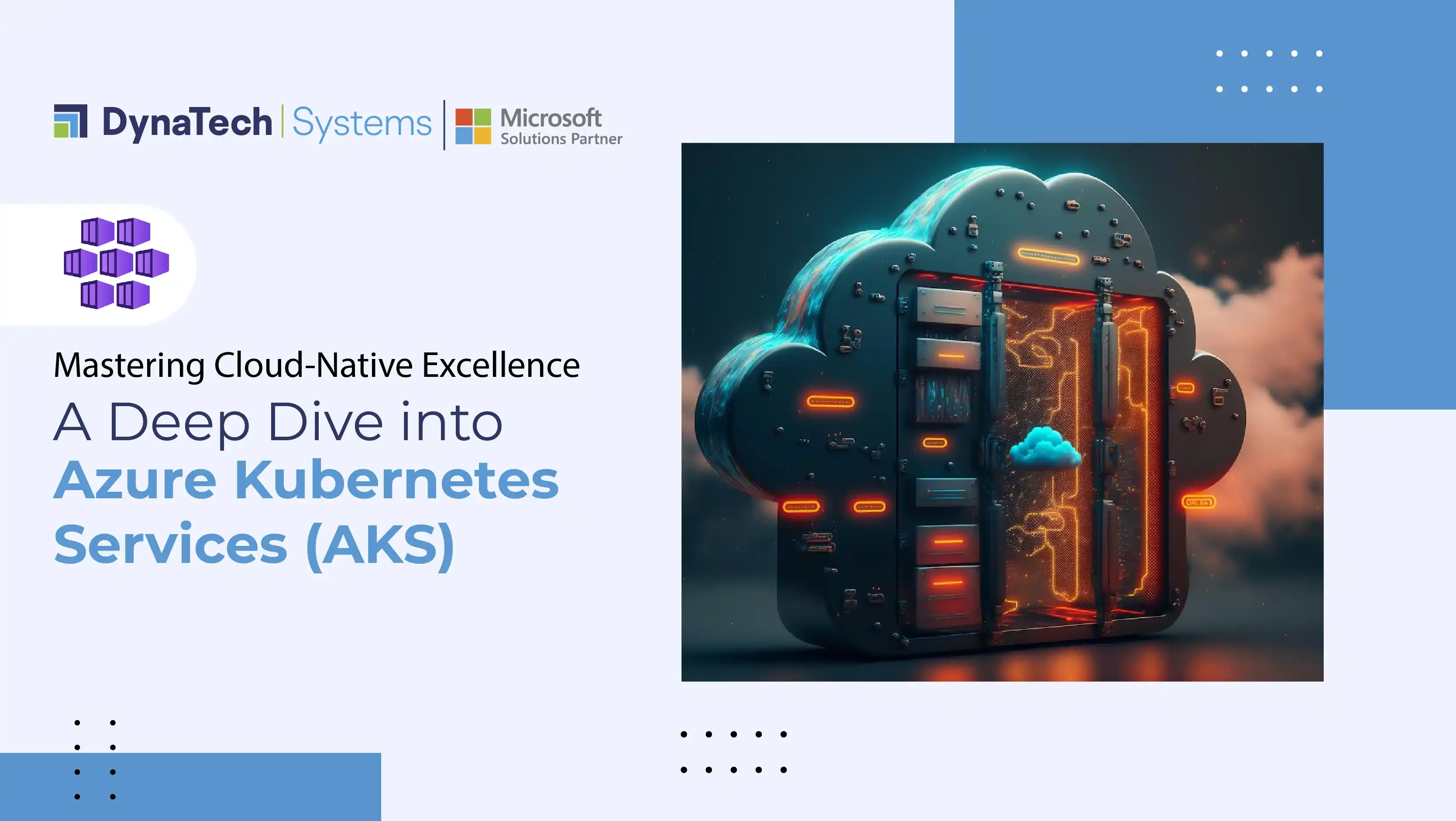In the dynamic and ever-evolving realm of cloud computing, Azure Kubernetes Services (AKS) has solidified its position as a transformative force, offering a formidable platform for the seamless orchestration of containerized applications. With the escalating adoption of containerization strategies by organizations worldwide, AKS has emerged as a pivotal solution, streamlining the intricacies involved in deploying, managing, and scaling containerized applications.
This blog post embarks on a comprehensive exploration of the above-mentioned services unraveling its sophisticated features, extolling its myriad benefits, and shedding light on essential concepts that empower businesses to navigate the intricate landscape of modern application deployment and management.
What is Azure Kubernetes Services (AKS)?
Azure Kubernetes Services, commonly known as AKS, is a managed container orchestration service offered by Microsoft Azure. It simplifies the deployment, management, and scaling of containerized applications using Kubernetes, an open-source container orchestration platform. With AKS, developers and operations teams can focus on building and running applications, leaving the complexities of managing the underlying infrastructure to Azure.
One of the standouts features of AKS lies in its role as an enabler for both development and operations teams. By offering a managed environment, AKS allows developers to channel their efforts towards crafting and refining applications without being burdened by the intricacies of infinrastructure provisioning and maintenance. Simultaneously, operations teams benefit from the automation and optimization features inherent to AKS, which simplify the deployment and orchestration of containerized workloads.
Features of Azure Kubernetes Services
Managed Kubernetes Cluster: AKS provides a fully managed Kubernetes cluster, eliminating the need for organizations to handle the operational overhead of maintaining the Kubernetes control plane. This allows development teams to focus more on writing code and deploying applications without worrying about the complexities of cluster management.
Automatic Updates and Patches: It handles automatic updates and patches for the Kubernetes cluster, ensuring that the environment is secure and up to date. This feature helps organizations stay focused on innovation rather than spending valuable time on maintenance tasks.
Integrated Developer Tools: AKS integrates seamlessly with popular developer tools and provides robust DevOps capabilities. It supports CI/CD (continuous integration and continuous deployment) pipelines, allowing developers to automate the deployment process and deliver applications faster.
Horizontal Scaling: With AKS, organizations can easily scale applications horizontally by adjusting the number of nodes in the cluster. This ensures optimal resource utilization and enables applications to handle varying workloads effectively.
Monitoring and Logging: AKS offers built-in monitoring and logging capabilities, allowing organizations to gain insights into the performance and health of their applications. Integration with Azure Monitor and Azure Log Analytics provides a centralized view of metrics and logs.
Benefits of Azure Kubernetes Services
- Simplified Deployment: AKS simplifies the deployment of containerized apps by reducing the complexities of managing infrastructure. Developers can easily use familiar tools and workflows to deploy applications, reducing the learning curve associated with container orchestration.
- Cost-Efficiency: By leveraging AKS, organizations can achieve cost-efficiency through optimized resource utilization. Avoid unnecessary expenses by scaling resources based on demand, ensuring efficient resource allocation.
- High Availability: It provides high availability by distributing applications across multiple nodes and availability zones. This ensures that applications remain accessible even in the event of node failures or other infrastructure issues.
- Security and Compliance: AKS incorporates robust security features, including Azure Active Directory integration, role-based access control (RBAC), and network policies. This helps organizations meet their security and compliance requirements while deploying and managing containerized applications.
Concepts Related to AKS
Kubernetes
At the core of AKS is Kubernetes, an open-source container orchestration platform. Kubernetes automates the deployment, scaling, and management of containerized applications, providing a framework for organizations to build and run scalable, resilient, and portable applications.
Containers
Containers encapsulate applications and their dependencies, ensuring consistency across different environments. AKS leverages containerization to package applications and their dependencies into a single unit, making it easier to deploy and manage applications consistently.
Node and Node Pools
In AKS, a node refers to a virtual machine that serves as part of the underlying infrastructure within a Kubernetes cluster. Nodes play a crucial role in executing tasks and running containers. These nodes collectively form the backbone of the AKS environment, providing the computational power necessary for deploying and managing containerized applications.
A node pool has a collection of nodes of the same configuration within a Kubernetes cluster. It allows for better resource utilization and management by grouping nodes based on similar characteristics, such as virtual machine size, operating system, or availability zone. Node pools in AKS enable users to scale and manage clusters efficiently, adapting to varying workloads and resource demands.
Node Selectors
Node selectors in AKS allow users to influence the scheduling of pods onto specific nodes. By using labels assigned to nodes and pod specifications, node selectors determine which nodes are eligible for running particular pods. This capability is valuable for optimizing resource allocation, ensuring that pods are deployed on nodes that meet specific criteria, such as hardware capabilities or geographic location.
Pod Networking
In the Kubernetes ecosystem, a pod is the smallest deployable unit and represents a logical group of one or more containers that share the same network namespace. Pods are fundamental to the architecture of containerized applications and encapsulate both the application code and its dependencies.
Networking in AKS
Cluster IP: Cluster IP is an internal IP address assigned to a Kubernetes service. This IP is accessible only within the cluster, making it suitable for communication between various components of an application. Cluster IP addresses are typically used for internal service discovery and communication among pods.
Node Port: Node Port is a networking feature that exposes a service on a specific port across all nodes in a Kubernetes cluster. This makes the service accessible externally, allowing traffic to reach the service from outside the cluster. While Node Port is useful for development and testing, it may not be the optimal choice for production scenarios due to potential security concerns.
Load Balancer: The Load Balancer service type automatically provisions an external load balancer in the cloud environment, distributing incoming traffic across the nodes running the service. This provides a reliable and scalable solution for exposing services externally while ensuring high availability and fault tolerance.External Name: The External Name service type allows a Kubernetes service to act as an alias for an external service. This is particularly useful when applications need to interact with services outside the Kubernetes cluster, as the External Name service redirects requests to the specified external domain.
Azure Virtual Networks
Azure Virtual Networks (VNet) serve as the networking foundation for various Azure services, including AKS. VNets enable the segmentation and isolation of resources, providing a secure and scalable networking environment. When AKS is deployed, it can be integrated with an existing VNet or create a new one, allowing organizations to leverage the benefits of VNets for their containerized workloads.
Azure CNI Networking
Azure Container Networking Interface (CNI) is a networking model that allows pods to have their own IP addresses within the Azure Virtual Network. In AKS, CNI enables efficient communication between pods, leveraging the underlying Azure networking infrastructure. This approach provides more flexibility and control over networking configurations, enhancing the overall performance and security of the AKS environment.
Network Security Groups (NSGs)
Network Security Groups in Azure are a fundamental component for controlling inbound and outbound traffic to network interfaces, VMs, and, by extension, AKS clusters. NSGs define security rules that filter and control traffic based upon the source and destination IP addresses, ports, and protocols. By configuring NSGs, organizations can enforce network security policies, restricting or allowing traffic to and from AKS resources.
Azure App Service vs. Kubernetes
While Azure App Service and Azure Kubernetes Services both offer solutions for deploying and managing applications, they cater to different use cases and scenarios.
- Azure App Service:
- Ideal for traditional web applications, APIs, and mobile backends.
- Offers a fully managed platform with automatic scaling, patching, and updates.
- Simplifies deployment through various deployment options, including Git, GitHub Actions, and Azure DevOps.
- Supports multiple programming languages and frameworks.
- Well-suited for scenarios where rapid development and ease of use are prioritized.
- Azure Kubernetes Services:
- Tailored for containerized applications and microservices architectures.
- Provides a managed Kubernetes cluster for orchestrating containers at scale.
- Enables organizations to deploy, manage, and scale containerized applications using Kubernetes concepts.
- Offers more granular control over the underlying infrastructure and container orchestration.
- Suitable for complex, distributed applications that require containerization and orchestration capabilities.
Conclusion
In conclusion, Kubernetes Services stands as a pivotal solution for organizations seeking to harness the power of container orchestration seamlessly. With its managed Kubernetes cluster, automatic updates, and integration with developer tools, AKS streamlines the deployment and management of containerized apps on the Azure cloud. By understanding the concepts related to AKS and comparing it with Azure App Service, organizations can make better decisions about the best-suited platform for their specific use cases. As containerization continues to shape the future of application development, AKS emerges as a robust and versatile platform, empowering businesses to innovate and thrive in the digital era.




























